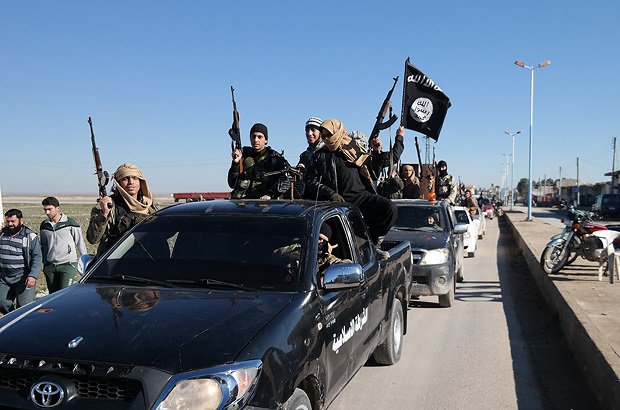
In this photo released on May 4, 2015, by a militant website, which has been verified and is consistent with other AP reporting, Islamic State militants pass by a convoy in Tel Abyad town, northeast Syria. AP
BAGHDAD, Iraq – Islamic State of Iraq and Syria (ISIS) jihadists have closed the gates of a dam in the Iraqi city of Ramadi which they seized last month, posing a humanitarian and security threat, officials said Tuesday.
ISIS fighters have repeatedly attempted to control dams in Iraq, in some cases reducing the flow of water to areas under government control or flooding swathes of land to distract and hamper military operations.
Anbar provincial council chief Sabah Karhout said ISIS “closed all the gates” at a dam in Ramadi, capital of Iraq’s largest province.
The move lowered the level of the Euphrates River and cut water supplies to the areas of Khaldiyah and Habbaniyah to the east, which are some of the last held by pro-government forces in Anbar.
The lower water level has also made it easier for ISIS to carry out attacks, Karhout said.
He called for the dam to either be quickly retaken or targeted in an air strike.
“Cutting the water to Khaldiyah and Habbaniyah will lead to a major humanitarian crisis not only in these areas” but also farther south, said Sheikh Rafa al-Fahdawi, a leader in the Albu Fahad tribe, which is fighting against ISIS.
Aoun Dhiyab, a former head of the Iraqi water resources department and an expert in water issues, said “the goal of (ISIS) is not to cut the water, but to reduce the level, to take advantage of it for military purposes.”
“When the water level is reduced, it allows them to infiltrate from Ramadi to Khaldiyah and then easily move to other areas,” he said.
Iraqi forces have launched a counteroffensive to try to recapture Ramadi but have so far either stopped on the city’s outskirts or focused efforts on severing jihadist supply lines.